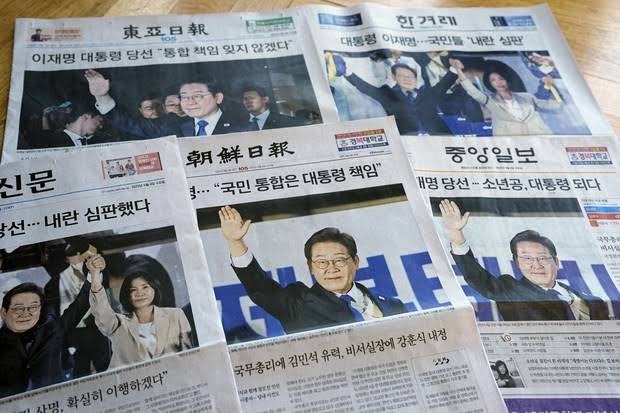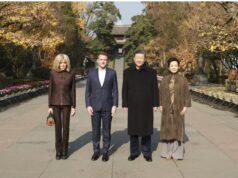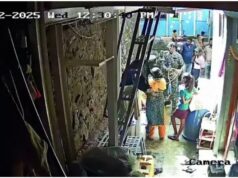New S. Korean President Lee emphasizes pragmatism after sworn in

This photo taken on June 4, 2025, in Seoul shows South Korean newspapers reporting the result of the presidential election
New South Korean President Lee Jae Myung of the country’s liberal Democratic Party vowed Wednesday that his government would prioritize pragmatism to overcome the crisis caused by ousted Yoon Suk Yeol’s imposition of martial law.
Lee also said in his inaugural speech that he will enhance trilateral cooperation with Japan and the United States while keeping the door open for a dialogue with North Korea. Regarding Japan, he suggested carrying on the existing compensation scheme over wartime forced labor at a press conference held later in the day.
The new administration “will be a government of just unity and flexible pragmatism,” Lee said in the speech at the National Assembly following his oath of office, a few hours after the election commission confirmed his victory over the conservative People Power Party’s presidential candidate, Kim Moon Soo.
“We will restore what has been shattered by rebellion including people’s livelihoods, the economy, national security, peace, and democracy, and we will build a society that continues to grow and develop sustainably,” Lee said.
The 60-year-old also emphasized the need for a pragmatic and national-interest-centered approach in diplomacy, while vowing to strengthen trilateral cooperation with the United States and Japan.
“Building upon the strong South Korea-U.S. alliance, we will strengthen trilateral cooperation with the United States and Japan, while approaching relations with neighboring countries from the perspective of practicality and national interest,” said Lee.
Lee added that his government will turn the crisis of a major global shift in the economic and security landscape into an opportunity to maximize South Korea’s interests. He faces key challenges, including talks on higher U.S. tariffs with President Donald Trump.
Regarding North Korea, he said his country will remain fully prepared against its nuclear threats and military provocations while keeping communication channels open as the South pursues dialogue and cooperation to build lasting peace on the Korean Peninsula.
During phone talks earlier in the day with Adm. Kim Myung Soo, chairman of the Joint Chiefs of Staff, Lee urged the military to make every effort to ensure that the people of South Korea have no need to be on alert over the North’s provocative actions.
Lee’s five-year term commenced immediately after winning the snap election, with the presidency vacant since April 4, when Yoon was removed following a Constitutional Court ruling that upheld a parliamentary impeachment over his brief declaration of martial law in December.
Since his election campaign, Lee has vowed to tighten martial law legislation, support smaller businesses and boost the economy.
Despite a firm stance on wartime labor and territorial disputes with Japan, he has called the neighboring country a vital partner and pledged deeper economic cooperation.
When asked about his thoughts on policies specifically toward Japan on Wednesday, Lee hinted at his willingness to implement solutions from the former Yoon administration on compensating South Koreans who were forced to work in Japan during wartime, saying that consistency matters when it comes to relationships between countries.
In 2023, the former government announced it would compensate those who won their wartime forced labor cases from a government-backed fund, instead of involving Japanese firms to pay direct compensation.
Lee added he hopes the two countries will build “rational and constructive” relationships, founded on mutual recognition, sincere apologies where appropriate, active cooperation where interests align, and fair competition where differences remain.
According to the National Election Commission, Lee secured 49.42 percent of the vote, ahead of the People Power Party’s Kim on 41.15 percent.
Turnout among the over 44 million eligible voters stood at 79.4 percent, the highest in 28 years, according to the commission.




